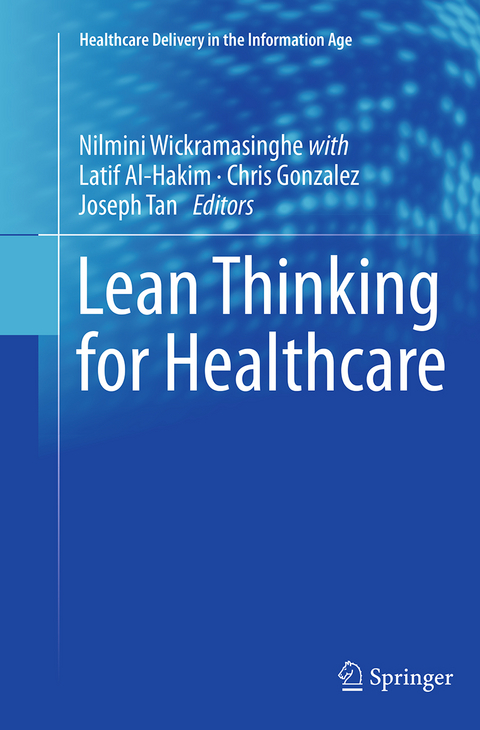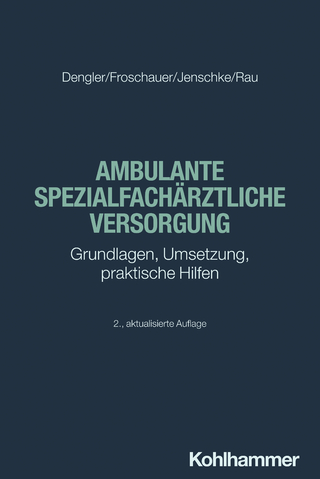
Lean Thinking for Healthcare
Springer-Verlag New York Inc.
978-1-4939-5245-8 (ISBN)
A growing, aging population; the rise to epidemic proportions of various chronic diseases; competing, often overlapping medical technologies; and of course, skyrocketing costs compounded by waste and inefficiency - these are just a few of the multifarious challenges currently facing healthcare delivery. An
unexpected source of solutions is being imported from the manufacturing sector: lean thinking.
Lean Principles for Healthcare presents a conceptual framework, management principles, and practical tools for professionals tasked with designing and implementing modern, streamlined healthcare systems or overhauling faulty ones. Focusing on core components such as knowledge management, e-health, patient-centeredness, and collaborative care, chapters illustrate lean concepts in action across specialties (as diverse as nursing, urology, and emergency care) and around the globe. Extended case examples show health systems responding to consumer needs and provider realities with equal efficiency and effectiveness, and improved quality and patient outcomes. Further, contributors tackle the gamut of technological, medical, cultural, and business issues, among them:
Initiatives of service-oriented architecture towards performance improvement
Adapted lean thinking for emergency departments
Lean thinking in dementia care through smart assistive technology
Supporting preventive healthcare with persuasive services
Value stream mapping for lean healthcare
A technology mediated solution to reduce healthcare disparities
Geared toward both how lean ideas can be carried out and how they are being used successfully in the real world, LeanPrinciples for Healthcare not only brings expert knowledge to healthcare managers and health services researchers but to all who have an interest in superior healthcare delivery.
Nilmini Wickramasinghe PhD, MBA, who currently holds the Epworth Chair Health Information Management was appointed in Dec 2009 as a Professor to RMIT University’s School of Business IT and Logistics and is also a core member of its Health Innovation and Research Institute(HIRi), RMIT University after being a professor in the US for 15 years. She researches and teaches in several areas within information systems including knowledge management, e-commerce and m-commerce, and organizational impacts of technology with particular focus on the applications of these areas to healthcare and thereby effecting superior healthcare delivery. Professor Wickramasinghe is well published with more than 300 referred scholarly articles, several books and an encyclopedia. She has collaborated with many large organizations such as NASA and GE as well as leading healthcare organizations such as the Cleveland Clinic, Johns Hopkins, Kaiser and NorthWestern Memorial Hospital. In addition, she regularly presents her work throughout North America, as well as in Europe and Australia.
Section 1 Key Concepts, Tools and Techniques.- Introduction.- Chapter 1 Lean Principles for Healthcare.- Chapter 2 Artificial Neural Network Excellence to Facilitate Lean Thinking Adoption in Healthcare Contexts.- Chapter 3 The Suitability of Artificial Neural Networks in Service Quality Control and Forecasting.- Chapter 4 The Application of Lean in the Healthcare Sector: Theory and Practical Examples.- Chapter 5 Business Value of IT in Health Care.- Chapter 6 Initiatives of Service Orientated Architecture towards Performance Improvement in Healthcare.- Chapter 7 Adapted Lean Thinking for Emergency Departments: Information Quality Perspective.-Section 2 Applications of Lean Thinking Around the Healthcare World.- Introduction.- Chapter 8 Adapted Lean Thinking for for Healthcare Services: An Empirical Study in the Traditional Chinese Hospital.- Chapter 9 Lean Thinking in Dementia Care Through Smart Assistive Technology - an Evaluation.- Chapter 10 A Delphi Study on Developing a Conceptual Framework to Understand the Perception of Iranian Physicians Towards Electronic Health Records.- Chapter 11 Trying to Streamline Healthcare Delivery in Australia via the Personally Controlled Electronic Health Record(PCEHR).- Chapter 12 Identifying Critical Issues for Developing Successful E-health Solutions.- Chapter 13 Applying the Principles of KM to Effect Streamlined Healthcare Operations: A Malaysian Case Study.- Chapter 14 Re-making Rosa Medical Center: A 5-Step Approach to Transitioning with Lean.- Chapter 15 Lean Thinking and Customer Focus.- Section 3 Macro issues.- Introduction.- Chapter 16 Applying A System of Systems Approach to Healthcare.- Chapter 17 The Role for a Healthcare System of Systems Approach Coupled with Collaborative Technologies to Provide Superior Healthcare Delivery.- Chapter 18 The Role Of A Disruptive Pervasive Technology Solution to Facilitate Better Healthcare Delivery to Native American Patients.- Chapter 19 Designing Enabling Regulatory Frameworks to Facilitate the Diffusion of Wireless Technology Solutions in Healthcare.- Chapter 20 Improving healthcare service quality and patients’ life quality through mobile technologies: the case of Diabetes self-management.- Chapter 21 The Role of Online Social Networks in Consumer Health Informatics: An Example of the Implicit Incorporation of Lean Principles.- Chapter 22 Supporting preventative healthcare with persuasive services.- Chapter 23 Using Technology Solutions to Streamline Healthcare Processes for Nursing: The Case of an Intelligent Operational Planning Support Tool (IOPST) Solution.- Chapter 24 Using an e-health Strategy to facilitate the design and development of effective healthcare processes.-Section 4 Micro issues.- Introduction.- Chapter 25 Value Stream Mapping in Lean Healthcare: A brief Introduction and Application.- Chapter 26 Using Value Stream Mapping to Improve Processes in a Urology Department.- Chapter 27 A Technology Mediated Solution to Reduce Healthcare Disparities.-Section 5 Case Studies.-Introduction. - Chapter 28 Process models, its inefficiencies and recommendations of the emergency department of the Marienhospital.- Chapter 29 Simulation Study - Clinical Center Esslingen.- Chapter 30 Emergency Department Katharinenhospital Stuttgar.- Chapter 31 Business Process Modeling and measuring waiting times in a German ED. An approach for identifying improvements.
| Erscheinungsdatum | 04.10.2016 |
|---|---|
| Reihe/Serie | Healthcare Delivery in the Information Age |
| Zusatzinfo | 178 Illustrations, black and white; XXXII, 645 p. 178 illus. |
| Verlagsort | New York |
| Sprache | englisch |
| Maße | 155 x 235 mm |
| Themenwelt | Medizin / Pharmazie ► Gesundheitswesen |
| Technik ► Medizintechnik | |
| Wirtschaft ► Betriebswirtschaft / Management | |
| Schlagworte | clinical governance • E-Health • electronic health records • healthcare delivery • Healthcare IT • Healthcare Management • Healthcare Operations • Lean Thinking • network centric healthcare • patient centric healthcare • practice audits with e-tools • Process variation in healthcare • Six Sigma • Waste reduction in healthcare |
| ISBN-10 | 1-4939-5245-5 / 1493952455 |
| ISBN-13 | 978-1-4939-5245-8 / 9781493952458 |
| Zustand | Neuware |
| Haben Sie eine Frage zum Produkt? |
aus dem Bereich


